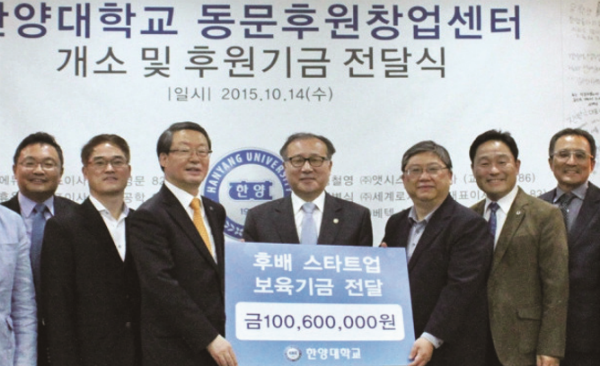December is the month when assignments and exams are finished, and Kingos may deeply ponder about their careers more than once. Kingos will prepare to develop their dreams toward various paths like getting a job, preparing for state examinations, or establishing businesses. SKKU provides support for these numerous paths. Among the different kinds of support, the Sungkyun Times (SKT) introduces startup education and support at SKKU, points out some limitations, and interviews a Kingo who received support from SKKU.
Startup Support Status at SKKU
Which Institutions at SKKU Help Kingos Get Startup Support?
SKKU institutions that help support startup education include the Entrepreneurship Education Center and the Startup Fostering Foundation. The Entrepreneurship Education Center was established in 2012, when SKKU was nominated for the Leaders in Industryuniversity Cooperation (LINC) project, a project supported by the Ministry of Education. Through the project, SKKU is working on efforts to develop entrepreneurship programs and start-up lectures, as well as fostering entrepreneurial clubs. The Startup Fostering Foundation, on the other hand, was established in 2016 after SKKU was selected as a Startup Leading University, a university equipped with outstanding startup infrastructures and education. This means that SKKU’s responsibilities now include the commercialization of entrepreneurial items, practical entrepreneurship education, activation of youth entrepreneurship, spread of entrepreneurial culture, support of technology start-ups and overseas expansion support.
What Support Can Kingos Get?
First, there are education programs such as startup lectures and startup camps. The purpose of the lectures are to encourage
students’ challenging spirits and abilities to think creatively and to capture opportunities. For instance, for the course “Understanding of Entrepreneurship with CEOs”, CEOs are invited to give lectures to students every week. In the course “Global Start-up & Business”, students team up with each other to select actual entrepreneurial items and establish fictional companies after getting advice from professors and seniors in entrepreneur clubs. Next, through startup camps, students can intensively learn about specific stages of entrepreneurship such as designing business plans according to social trend analysis, refining and deepening ideas, drawing marketing strategies and developing plan books. “Kickstart Sungkyunkwan”, which is a typical example of a startup camp, operates under a different theme each season according to the needs of the students. The topic of the most recent camp was 3D printing and programming.
Second, SKKU provides various kinds of support to startup clubs. According to the Entrepreneurship Education Center, 33 clubs and about 300 students are currently receiving assistance from the center, and the fields of the clubs are various ranging from software to clothing to electronic commerce. For instance, S.V.P., a club with over 70 students, is now developing projects for applications. If a club is registered as a startup club, students can get a lot of support as SKKU provides practical training for startups through market demand research, and grants opportunities to participate in contests and seminars related to domestic and overseas entrepreneurship. In addition, mentors from the Graduate School of Global Entrepreneurship are connected and prototype production and material costs are provided. Moreover, professors’ judging of business plans and startup items is offered. Items that are evaluated as being excellent would receive government funding and technical support as well.
Lastly, as of March 2016, SKKU offers a system of allowing students to take a leave of absence for four semesters regardless of their past leave of absences. To start a business, not only funds but also enough time is required. Since it is not easy for students to focus both on studying and a startup business at the same time, they usually take a leave of absence from school and then start a business. A general leave of absence can be up to two semesters at a time, however, making it difficult to experience a business properly during that short time period. Fortunately, through the new system, students can fully devote up to six semesters to their businesses.
Limitations and Ways to Improve
Although there is a lot of support given to Kingos in trying to start businesses, there are several shortcomings to overcome. First, practical experiences are needed. Most of the entrepreneurship lectures have limitations because students can merely experience business at a fictional level. Students need real chances to create their entrepreneurial items. In other words, there is a need for a more direct and practical experience. For instance, at the Polsky Center for Entrepreneurship and Innovation of the University of Chicago, students can experience the entrepreneurial model they want to pursue by enrolling in specific courses. Through the “New Venture Lab” course, students are sent to startup companies or small and medium enterprises to participate in actual business operations where they can experience various difficulties and opportunities of enterprises. Through the “Social Enterprise Lab” course, after working closely with local social enterprises, students are given a mission to analyze and propose the company’s development strategies. It would be truly helpful to Kingos if they had opportunities to learn actual work styles through practical experience and figure out the structure of the company they want to establish through these types of courses.
Second, the creation of a friendly atmosphere via the strengthening of promotions of the programs is needed. Except for the posters
on school bulletin boards, there are almost no promotions related to startups. The Startup Fostering Foundation does not even have an official homepage, and the homepage of the Entrepreneurship Education Center has not been renewed. If the homepages are reopened or renewed and KakaoTalk open chat rooms are used, Kingos would be able to get information more easily. In addition, there is no system that even acknowledges startups other than the startup leave of absence system. This may be an obstacle in the formation of a startup friendly atmosphere. Therefore, it is necessary to introduce a system which recognizes business preparation activities and the actual establishment of companies as credits.
Last, building an alumni network related to startups is needed. Currently, there are no school-level networks at SKKU where Kingos can listen to experiences or advice from seniors who have founded real enterprises. There is only a network among current entrepreneur clubs, so there is no way for general Kingos to get information from business founding seniors. In the case of Hanyang University, for example, there is a network of start-up alumni, which allows CEOs who graduated from the university to gather and provide startup information through forums and lectures. Students, including undergraduates, can obtain useful information through the network. If such networks existed at SKKU, Kingos would be able to boost their interest in startups and get sufficient and realistic information.

Interview with Kim Yeon-woong
There are some Kingos working hard to achieve their goals through startups. The SKT interviewed a Kingo who is currently the CEO of the corporation WOONG Inc.
Please introduce yourself and the project you are participating in.

I am a student majoring in psychology at SKKU and the CEO of WOONG Inc, a counseling corporation. Through WOONG Inc, I am trying to break the prejudices against counselors and counselees such as the biases that counselees have serious mental illnesses. Our company is operating two types of solutions to break the stereotypes. First, we are trying to boost the spread of counseling culture. For example, we afford counseling of numerous topics to university students who are interested in “love” via group counseling. The other is the reformation of the counseling market. We started the homepage “상담을 잇담” to activate a counseling community by encouraging people to share counseling experiences and we interlocked the website with Social Network Services (SNS) such as Facebook, to take the lead in the spread of counseling culture. Meanwhile, there are currently 43 people in the company. The members consist of Kingos, students from other universities, and graduates.
How did you get support from startup institutions at SKKU? Among the support you received, what was the most useful?
While establishing my corporation, I was worried about where to get help because a lot of time, effort, information, and capital are important in the foundation of a business. I searched for support from SKKU first, then found the “Entrepreneurship Program” from the Startup Fostering Foundation, a program that helps to form startup clubs and corporations. I could get not only economic support, but also related education, information and infrastructures. Among them, it was considerably useful that our school provides space for our company members to assemble. On the first floor of the Business Hall, there is a Startup Campus that students can use. Accessibility of the space is convenient and it allows students to gather easily. Personal help was also useful to me. When I went to professors and the center chief of the Startup Fostering Foundation, they didn’t hesitate to give helpful advice and information to me.
What do you think should be improved in terms of support?
First, SKKU needs to consider providing spaces like the Startup Campus in between the Humanities and Social Sciences Campus and the Natural Sciences Campus. Currently, it is difficult for Kingos from different campuses to exchange ideas, making it difficult to cooperate. In the case of our company, one of the members has to come from the Natural Sciences Campus to the Humanities and Social Sciences Campus for meetings. Rather, it would be more efficient to provide spaces around Sadang or Gangnam, the middle points of the two campuses. Second, customized support is necessary. Instead of merely giving the same education to everyone, customized advice would be more effective. For example, I think it would be helpful if we discussed the specific usage of expenses with experts. Third, there should be more concentrated all-day lectures. In the current startup lectures, students end up just planning items with team members. Rather than that, it is more efficient to develop all-day compact courses that provide students the chance to deeply consider overall processes, including not only planning but also item embodiment and marketing research with the help of experts. Such courses may lead to an increase of customized assistance toward each startup club and company.
What do you think of an alumni network with senior entrepreneurs?
Is there already such a network at SKKU? SKKU holds “The Night of Network” to encourage networks among Kingo entrepreneurs. The network is nearly inactive, though. Simply gathering startup people through “The Night of Network” has no effect because people have no prior knowledge of each other, which leads to the difficulty of building friendships and networks. Instead, information about other entrepreneurs and their projects should be provided to entrepreneurs first. After going through the information, they would then meet each other and more easily learn about people in similar fields. If people knew each other to some degree in advance like that, networks could be formed more effectively.
What efforts should be made to further create a startup-friendly environment?
Currently, startup lectures are mainly aimed at majors in the School of Business. In reality, however, many Kingos in various majors and fields want to start a corporation. Therefore, the startup lectures should be opened to all students regardless of their major. In addition, there should be classes for Kingos who wish to start an actual corporation. In those classes, various activities like writing business plans and interviewing real companies should be included to build up practical experiences. As well, there should be systems like acknowledging credits if they eventually do establish a company.
